Tackling stubborn residue on pots and pans is a challenge that many face in the kitchen. Despite best efforts, certain foods leave behind a mess that seems almost impossible to clean. However, understanding the right cleaning techniques can transform this daunting task into a simple routine. This blog post delves into a variety of effective remedies for cleaning stubborn cookware, ensuring that these culinary tools remain in pristine condition. The importance of maintaining cookware cannot be overstated, as it not only extends the life of the kitchenware but also ensures a safe and enjoyable cooking experience.
Contents
Let Them Soak
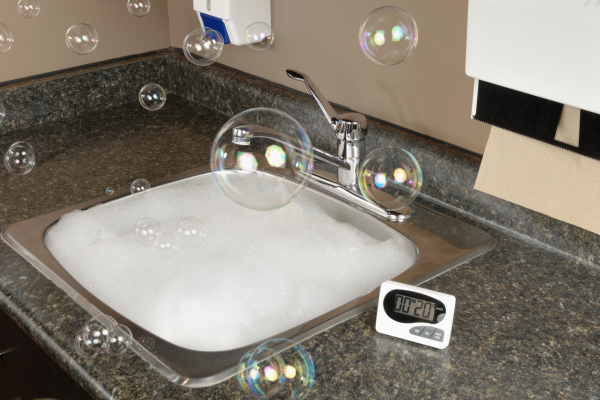
The first step in addressing stubborn pots and pans is to let them soak. This method is particularly effective for cookware with baked-on food or greasy residue. Filling the pot or pan with hot water and adding a few drops of dish soap can work wonders. The key is to allow enough time for the water to penetrate and loosen the residue. Soaking not only softens the food particles but also makes the subsequent cleaning process much more manageable. It’s advisable to soak the cookware for at least an hour, or even overnight for extremely stubborn cases.
While soaking is a passive cleaning method, it’s effectiveness should not be underestimated. To enhance the soaking power, adding baking soda to the mix can provide an extra boost. This mild abrasive aids in breaking down tough stains without scratching the surface of the cookware. After soaking, the majority of the residue will often wipe away effortlessly with a sponge or brush. For those who dread the thought of scrubbing, remember that a proper soak can significantly reduce the elbow grease required in the cleaning process.
Scrub With Baking Soda
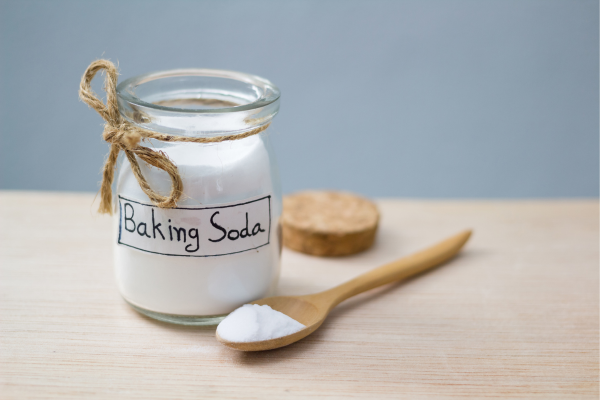
Baking soda is a versatile cleaning agent, known for its gentle yet effective abrasive properties. It is especially useful for cookware with stubborn stains that require a bit more attention. To utilize baking soda, create a paste by mixing it with a small amount of water. The consistency of the paste should be thick enough to adhere to the surface of the cookware. Apply this paste directly onto the areas with the most residue and let it sit for a few minutes to allow the baking soda to work its magic.
After allowing the paste to set, use a sponge or a non-metallic brush to scrub the affected areas gently. Circular motions are effective in lifting the residue without causing damage to the cookware’s surface. Baking soda is particularly beneficial for stainless steel and enameled cookware, as it cleans without scratching. Once the scrubbing is complete, rinse the cookware thoroughly with water to remove any remaining baking soda. Not only will the cookware be cleaner, but it will also have a renewed shine, making it look almost as good as new.
Vinegar For Shine And Disinfection
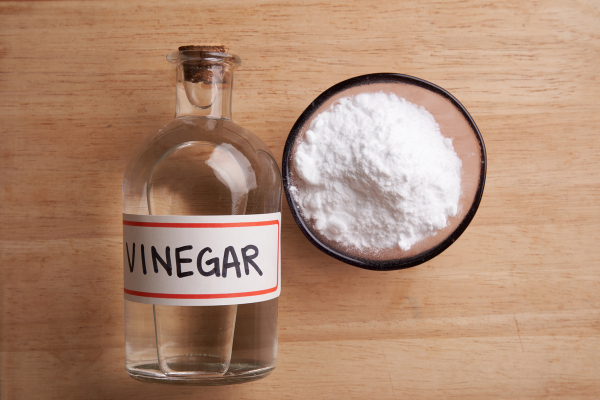
Vinegar, with its acidic nature, stands out as a remarkable solution for cutting through grease and restoring shine to pots and pans. Its disinfectant properties ensure that, aside from cleanliness, cookware remains hygienic for the next culinary adventure. A mixture of equal parts water and vinegar, heated in the cookware on the stove, can effectively loosen the residue. The warmth of the mixture works in tandem with the vinegar’s acidity to break down even the most stubborn grease.
Post-soaking, using a sponge or brush to wipe away the loosened residue completes the process. Vinegar’s natural deodorizing property ensures that any lingering food odors are neutralized. It is particularly beneficial for stainless steel and glass cookware, leaving them not only clean but also with a mirror-like shine. Rinsing thoroughly after cleaning is crucial to remove any vinegar traces, preventing any potential impact on the taste of future meals.
Salt Scrubs For Cast Iron
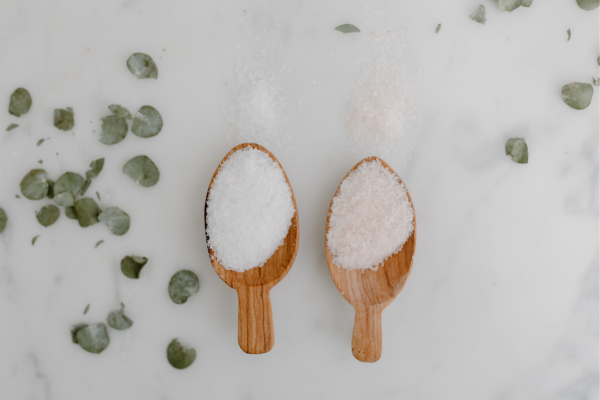
Cast iron cookware requires special care, and salt serves as an excellent cleaning agent that preserves the essential seasoning of these pans. Coarse salt, when used as a scrubbing agent, effectively removes food particles and residue without compromising the seasoned layer. Sprinkling a generous amount of salt onto the cookware and using a paper towel or cloth to scrub can yield impressive results. The abrasive nature of the salt grains dislodges residue, making cleaning a less laborious task.
Post-scrubbing, removing the salt and residue with a clean cloth or paper towel is essential before rinsing or wiping the cookware with a damp cloth. It’s imperative to avoid water-based cleaning methods for cast iron, as they can lead to rust and deterioration of the seasoning. Regular care with salt scrubs not only maintains the quality of cast iron cookware but also enhances its non-stick properties, ensuring a longer lifespan and superior cooking performance.
Lemon For Freshness And Stain Removal
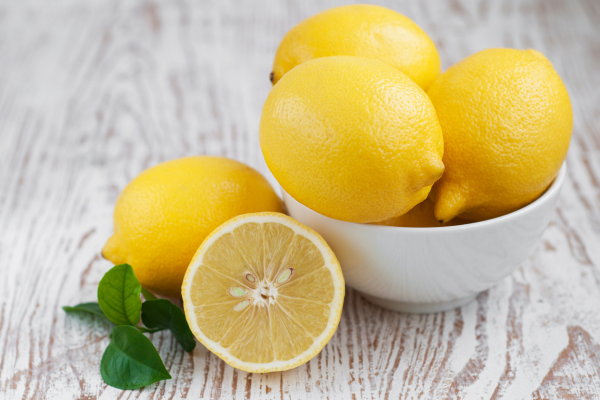
Lemon’s natural acidity makes it an exceptional choice for removing stains and refreshing cookware. Its bleaching effect works wonders on discoloration, while its fresh scent leaves cookware smelling clean. Halving a lemon and using it as a scrubber provides a dual action of abrasion and acid, tackling stains effectively. For tougher stains, sprinkling some salt or baking soda on the lemon half enhances the scrubbing action, making the process even more effective.
Creating a cleaning solution with lemon juice and water offers an alternative method for cookware that requires a gentler approach. Soaking cookware in this solution or using it to wipe down surfaces helps in removing light stains and odors. The natural oils in lemon also contribute to a subtle shine, making cookware not only clean but also aesthetically pleasing. Rinsing thoroughly after cleaning ensures that no citrus residue affects the flavors of future meals.
Commercial Cleaners: When To Use Them
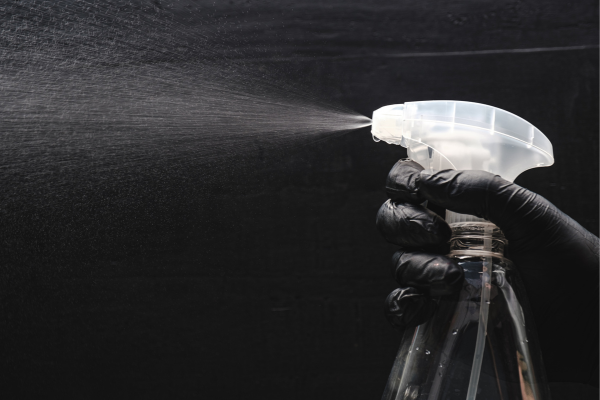
There are instances where the residue on cookware is so stubborn that natural remedies may not suffice. In such cases, commercial cleaners designed specifically for cookware can be effective. These products often contain active ingredients capable of breaking down the toughest stains. However, it’s crucial to choose cleaners suitable for the specific material of the cookware to avoid any potential damage.
Reading labels and understanding the active ingredients in commercial cleaners is paramount. Safety should never be compromised, and protective gloves should be worn when handling these products. Ventilation is also crucial, as some cleaners may emit fumes that are harmful if inhaled. Following the instructions precisely ensures not only the effectiveness of the cleaning process but also the safety of those undertaking the task.
Preventive Measures And Regular Care
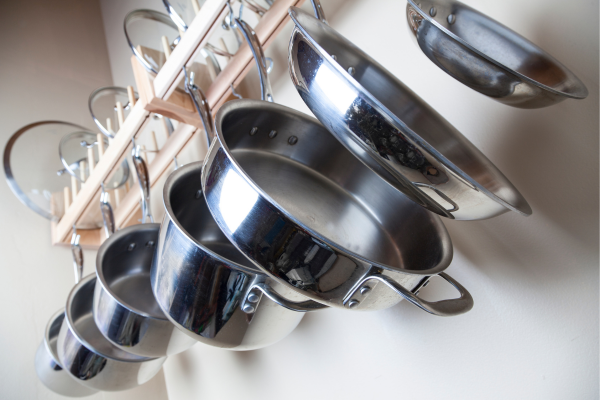
Preventing stubborn stains and residue is equally as important as knowing how to clean them. Proper cooking techniques, such as avoiding overheating oils and fats, can significantly reduce the likelihood of stubborn residue. Immediate cleaning after cooking, even if it’s a simple rinse or wipe, can prevent residue from hardening and becoming more difficult to clean later on.
Regular maintenance routines, including proper storage and periodic deep cleaning, extend the lifespan of cookware. Non-abrasive cleaning tools and gentle detergents are preferable for regular use to maintain the integrity of the cookware’s surface. Embracing these preventive measures and maintenance routines not only keeps cookware in optimal condition but also makes the cleaning process more manageable and less time-consuming.
The Bottom Line
Maintaining clean and well-preserved cookware is essential for any kitchen. The remedies discussed, from soaking and scrubbing with natural ingredients to understanding when to opt for commercial cleaners, provide a comprehensive guide for tackling stubborn pots and pans. Each method has its place and effectiveness, depending on the type of cookware and the severity of the residue. Integrating these cleaning techniques into kitchen routines ensures that cookware remains in top condition, enhancing both the joy of cooking and the quality of meals.


